
GET IN TOUCH TO make an appointment
We offer a free initial consultation, so please don’t hesitate to get in touch with any queries you may have or click here to book your telephone consultation now.
T. 07985 122 359
FIND US
ADDRESS
Pinewood House
Room 3, First Floor
28 Victoria Road
Hale
WA15 9AD
PARKING
There is free street parking for up to 2 hours on Victoria Road, Broomfield Lane or Albert Road. There is also pay and display parking available in the train station.
PUBLIC TRANSPORT
Hale train station is a stone's throw away from the office on Victoria Road. The closest tram stop is Altrincham interchange 15-minute walk away.
Frequently asked questions
We appreciate Brain Training is an investment and we are here to answer any questions you may have. Get in touch for a free consultation. Some of our most frequently asked questions are below.
-
This is only possible to predict once we have more specific information about your goals and history. At a minimum, we recommend 20 one-hour sessions to achieve lasting effects. Generally, most individuals will respond well in 20-40 sessions.
Predicting how quickly or effectively you will react to the training is impossible as all clients' brains, symptoms, and goals are unique.
Some people will notice changes after just a couple of sessions, although it will take multiple sessions for the brain to learn the new optimal means of functioning fully.
Everyone is different, and everyone's brain is different. Therefore, some people will require more sessions than others. You can expect the gains from the training to be cumulative, and usually, 20 sessions will deliver lasting and significant benefits for most clients. More serious conditions/neurodevelopmental disorders may take longer to achieve substantial gains.
Just like building a muscle, strengthening the brain requires regular practice.
We take the time to understand your home and work environments and help you ensure they support the training process. But like with any form of training, Neurofeedback brain training needs you to be motivated and committed to the training programme and schedule.
The ideal training schedule is two sessions per week. This is particularly important at the start of your training journey (the first 10 – 20 sessions) as we work together to find your optimal training plan. Shorter gaps between sessions improve the quality and accuracy of your feedback with your experience post-session. This enables us to fine-tune your training plan more efficiently and get you to an improved state of functioning quickly. For those seeking a more intensive training programme, the maximum number of sessions we would provide is 3 per week.
-
Whilst some providers may offer remote neurofeedback services, in our experience, the outcomes and quality of the training provided are vastly improved from in-person sessions. There are many subtleties to each individual's experience during a session, and there are many signals related to the person's response to training that are much more difficult or impossible to see when providing sessions remotely.
At Optiminds, we place high value on the therapeutic face-to-face experience we have with every client we work with, and the aim is to get you to a better state of functioning as quickly as possible. It is for this reason that we only offer private, in-clinic sessions.
-
The effect usually lasts once the brain has learned to function more efficiently, and relapse rarely occurs (in contrast to pharmacological intervention). After the sessions are complete, most clients will not feel the need to return. However, some clients may require a 'booster' during challenging times.
-
Some people may be slightly worried about using sensors on the scalp. We can assure you that there is absolutely nothing to be concerned about. The sensors read brainwave activity – there is never any input into the brain. Wearing the cap feels similar to a swimming cap. You may also have small amounts of residual gel in your hair.
-
Yes. Controlled scientific studies have taken place since the early 1960s and have shown QEEG and Neurofeedback to identify and manage a wide range of symptoms associated with brain dysregulation effectively. For a comprehensive bibliography of the research, please see the following link -
https://www.isnr.org/isnr-comprehensive-bibliography
-
At Optiminds, each brain training programme is determined individually, so we can only say in advance which particular modalities would be recommended to you once you have had a thorough assessment with us. The neurofeedback modalities we have available include:
Single-channel EEG band training.
Infralow Neurofeedback.
19 Channel LORETA neurofeedback.
Z-Score neurofeedback
and pirHEG.
-
Unfortunately, not currently.
-
In most cases, there is a reduction in presenting symptoms or functional difficulties. However, Neurofeedback is not a magic wand, and it takes time to promote better regulation and stability in the brain. Open communication, commitment to regular sessions and engagement with us in a positive therapeutic relationship is critical to enable us to get the best possible outcome from your sessions.







